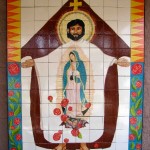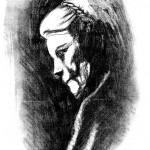James came to volunteer with the immigrants at Casa Juan Diego, the Houston Catholic Worker, after hearing a talk at St. Cyril’s Church, where the pastor insists that the Catholic Workers speak periodically. James came from a family of refugees on the run, but he was able to receive a good education and training. He… continue reading
A Call to Change America: How would Dorothy Day Respond to an Attack such as September 11?
The tragedy of September 11 has given us the opportunity to re-evaluate how we live and how we relate to other countries. We don’t want this to be a lost opportunity. Those who take the spiritual life seriously have to ask the question, not only why did this happen, but what is God asking of… continue reading
Juan Diego is a Saint! Why is the Houston Catholic Worker called Casa Juan Diego?
We heard the news with joy that Juan Diego, has passed the final step in the process to sainthood in the Catholic Church. We named the first house of the Houston Catholic Worker, Casa Juan Diego, and as more houses were opened over the years, the name Casa Juan Diego became an umbrella… continue reading
A Day at the Houston Catholic Worker: Grown Men Cry
Pedro kept telling me about the problem: He can’t work anymore and thus can’t pay the rent for the one room apartment where he and his wife live. We know his place because we had given the furniture for the apartment and moved their few belongings. Pedro said that he was waiting for a bus… continue reading
Dorothy Day and St. Therese of Lisieux respond to the Despair of our Time
Dorothy Day’s book, Therese: A Life of Therese of Lisieux (Springfield, Illinois: Temple-gate Publishers, 1960, 1991), the fruit of much research and study on Dorothy’s part, captures the heart of the message of Saint Therese of Lisieux and reveals also the depth of Dorothy’s own spirituality. At the time when Dorothy wrote about her, she was… continue reading
G.K. Chesterton and Dorothy Day on Economics:Neither Socialism nor Capitalism (Distributism)
The following is a talk given at the American Chesterton Society annual conference in St. Paul, Minnesota, in June 2001. Dorothy Day and G. K. Chesterton were contemporaries. Both came into Catholicism in the 1920’s, Chesterton in 1922 at age 48 and Dorothy five years later at age 30. Both spent years of reading, studying,… continue reading
John Paul II: Globalization Must Not Be a New Form of Colonialism
In recent months John Paul II has been critiquing the economics of globalization, raising serious ethical questions about the way it is implemented. It is almost as if he knew that some prominent Catholic writers, especially in the United States, were advocating in the name of the Church an economics based on using people as… continue reading
Multinationals Rob Seeds of Poor: Vandana Shiva and Houston Catholic Workers Protest Patenting of Life Forms at RiceTec in Alvin, Texas
It seemed incredible. A corporation in Alvin, Texas, just an hour and a half by car from Casa Juan Diego, was trying to patent seeds that rice farmers had developed over centuries in India and Pakistan. Actually, they had already done so and were in the process of renewing the patent. Farmers in India and… continue reading
Dorothy Day and the LIGHT FROM THE EAST: Eastern Christianity, Fathers of the Desert, Dostoevsky
Dorothy Day read great literature all of her life and her reading especially included some of the Russian writers, most of all Dostoevsky. Her reading of authors from the East, which she shared with readers of The Catholic Worker, included not only fiction, but theology, monastic writings and history. She knew the monks from St…. continue reading
Virgil Michel, Benedictine Co-Worker of Dorothy Day and Peter Maurin: Justice embodied in Christ-life and Liturgy
“What blasphemy! As if there were anything really Christian about our modern capitalism.” This was Virgil Michel, O.S.B., responding in Commonweal in 1938 to an article inCatholic World which had called Christ “the first preacher of capitalism as the most workable thesis for society.” Michel had to respond to the neocons (Michael Novak, etc.) of his… continue reading




